Close UP
Taito Tabunka Kyosei Machizukuri no Kai – Taito Multicultural Community Development Group ~Seeking a form of multicultural coexistence that is unique to Taito City, with foreigners and Japanese facing local tasks as residents of the same community.~
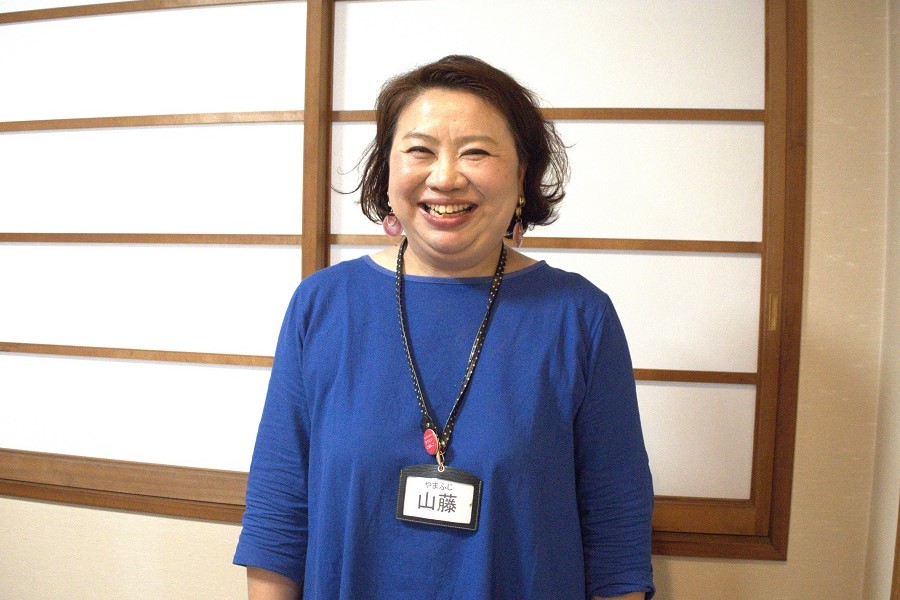
"Taito Tabunka Kyosei Machizukuri no Kai" is a group of foreigners and Japanese people living in Taito City who think about community development together as community members, through activities such as neighborhood clean-ups and opening stalls at morning markets. We interviewed Ms. Hiroko Yamafuji, the Multicultural Coordinator and Regional Japanese Language Education Coordinator - who launched "Taito Tabunka Kyosei Machizukuri no Kai" together with local foreign residents - about the activities of the group.
Working Together as Peers in the Same Community Through Community Development
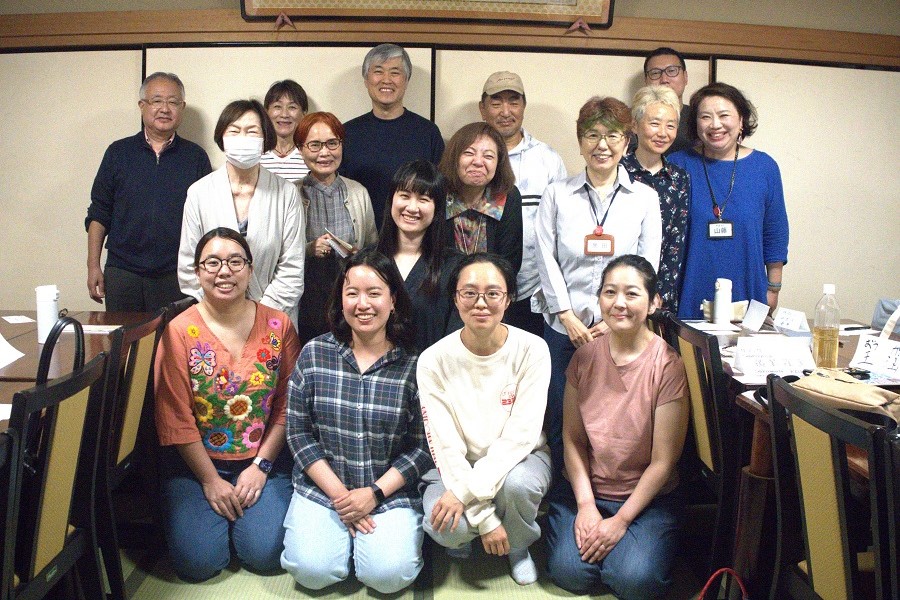
Taito City has the fourth largest number of foreign residents in Tokyo. In recent years, multicultural coexistence has also become a regional theme in this area.
"Taito Tabunka Kyosei Machizukuri no Kai" is a group which was founded in 2024 by Ms. Yamafuji - who taught Japanese at a local Japanese language class - and foreign residents who finished her class. The name "Taito Tabunka Kyosei Machizukuri no Kai (Taito Multicultural Community Development Group)" expresses the group's hope that Japanese and foreign residents may work together on community development on an equal footing, as fellow local residents.
"When I talk to foreigners who attend Japanese language classes, I often hear them say that they don't really have opportunities to use their Japanese even after studying it, or that there is no opportunity to talk to Japanese people or connect with the local community after they complete the Japanese language classes. Taito City has also been experiencing problems with the poor manners of foreign tourists visiting Asakusa and other areas, which has led to misunderstandings and prejudice towards foreign residents in the area. Each and every one of the foreign residents (living in Taito City) is trying to make a living in Japanese society by paying taxes like us, studying the Japanese language, and learning Japanese culture as well as local manners. In order to live together in the same community, I felt that the first step is to create opportunities for Japanese and foreigners to meet regularly and interact, and converse with each other. As we see each other more and more, we naturally change from 'a foreigner' to 'XX-san," says Ms. Yamafuji.
"Oedo Cleanup squad,” Conducted by Japanese and Foreigners Together
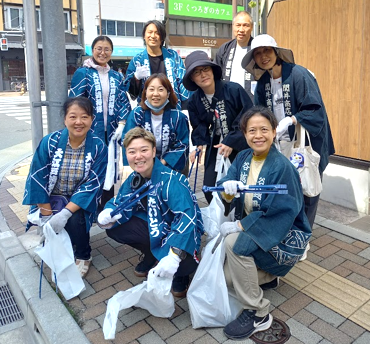
Photo Courtesy: Taito Tabunka Kyosei Machizukuri no Kai
In recent years, littering by foreign tourists around Asakusa has become a local problem in Taito City. In addition, the number of guesthouses for tourists is growing, and some Japanese are afraid of young foreign tourists making a lot of noise in the area. Due to misconceptions and prejudice against foreigners arising from those situations, many foreign residents experience that they are not invited to local festivals and events, or that they are not greeted even though they live in the same apartment building.
When "Taito Tabunka Kyosei Machizukuri no Kai" was established, the first thing foreign members said they wanted to do was to contribute to the community by joining "Oedo Cleaning Squad". When a group is accredited by Taito City as a registered "Oedo Cleaning Squad", cleaning equipment and hanten coats are given to the group by the city. At the most, there are about 30 participants in Taito Tabunka Kyosei Machizukuri no Kai's Squad. After all participants learn how to separate waste, Japanese and foreigners work in the same group to clean up the area. While cleaning, they are often approached by people from the local community and neighborhood associations.
"We mainly conduct clean-up activities in Asakusa's tourist areas, around temples, and around Asakusabashi's guesthouses. Many local people are surprised when they see us working as a Cleaning Squad, and realize that foreigners have the same awareness of issues as Japanese people. I would be happy if our activities, which are visible to the local community, help to eliminate prejudice against foreign residents," says Ms. Yamafuji.
Creating Opportunities for Collaboration Between Foreign and Japanese residents at Local Gatherings
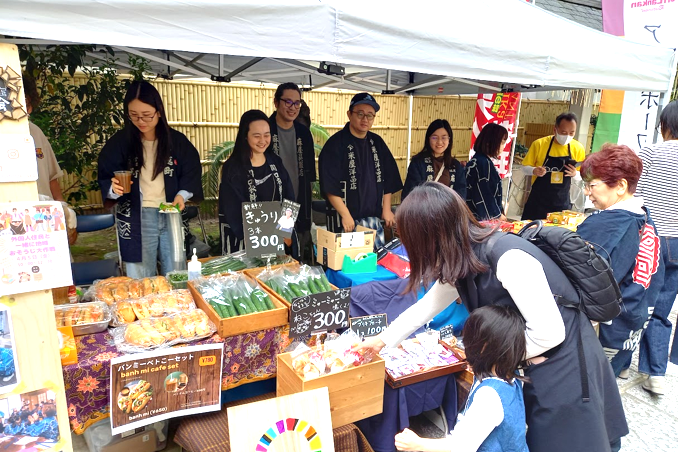
Photo Courtesy: Taito Tabunka Kyosei Machizukuri no Kai
Members of "Taito Tabunka Kyosei Machizukuri no Kai", both Japanese and non-Japanese, participate in a morning market held at a shrine in Asakusabashi on the third Sunday of each month. They sell a variety of items at the morning market, including Indian spices, tea, bahn mi (Vietnamese sandwiches), handmade accessories, and vegetables.
"We participate in the morning market with a diverse group of people, from long-time residents of the community to those who have recently moved to the area. I thought there needed to be a place where foreigners and local people can collaborate," says Ms. Yamafuji.
The morning market is visited by locals and tourists. Many Japanese who come for vegetables are attracted by the unusual foreign items. It also provides an opportunity for foreign participants to play an active role by labeling products in multiple languages, for tourists.
"Foreign participants' perspectives can be helpful in marketing products to tourists. Once, a Thai person came up with the idea of posting a sign in Thai saying, 'We sell cookies,' and many Thai tourists came to our stall. That person dreams of getting a cooking license, and opening a shop. An elderly Japanese participant supported this foreign participant who was active with their dreams, and helped pack cookies. I would be happy to see more of such relationships in the community," says Ms. Yamafuji with a smile.
Multicultural Coexistence Accelerated by the Children's Genuine Thoughts and Feelings
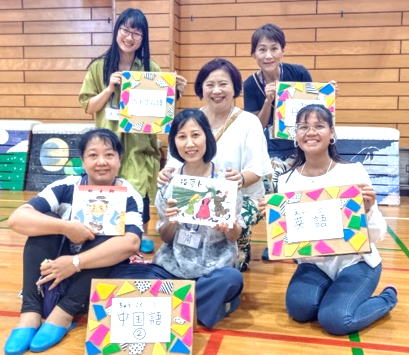
Photo Courtesy: Taito Tabunka Kyosei Machizukuri no Kai
After-school classes at Taito City elementary schools also offer activities called "Let's Play in English" and "Let's Play in Chinese," in which students play using English or Chinese. When foreign mothers volunteered to help in an after-school class, parents of the children who came to the class requested that the foreign volunteers teach English. Children enjoyed playing the telephone game and musical chairs, using English. Eventually, other after-school classes began to ask for help. And then, children wanted to be taught Chinese.
"There are many Chinese residents in Taito City, and children with Chinese roots are a common sight in their classes. For children in this local area, the most familiar foreign country is China. Children are willing to participate, perhaps because they want to learn Chinese in order to get to know their friends better. Children are motivated by a pure feeling of wanting to be friends with the person in front of them, and I think they are much more open to multiculturalism than adults," says Ms. Yamafuji.
In addition, the group also reads multilingual picture books to children at the Taito City Central Library, and at after-school classes at elementary schools. They read famous Japanese picture books to children in various languages, including Chinese, Thai, and Vietnamese. Even if the children do not understand a language, they enjoy the different sounds and intonations of foreign languages, and many of the library staff and Japanese volunteers are surprised.
"You can participate as a multilingual picture book reading (volunteer), even if you do not speak Japanese. When a foreign mother who could not yet speak much Japanese read a picture book in her native language, I was impressed by how proud her son was to see his mother (read in front of an audience). What we value is to create an environment where people can enjoy and participate in the program regardless of their level of Japanese proficiency. And we want the community to know about the activities of foreign residents. In fact, foreign residents are increasingly depended on by local residents," says Ms. Yamafuji.
Community Involvement Created Through Activities
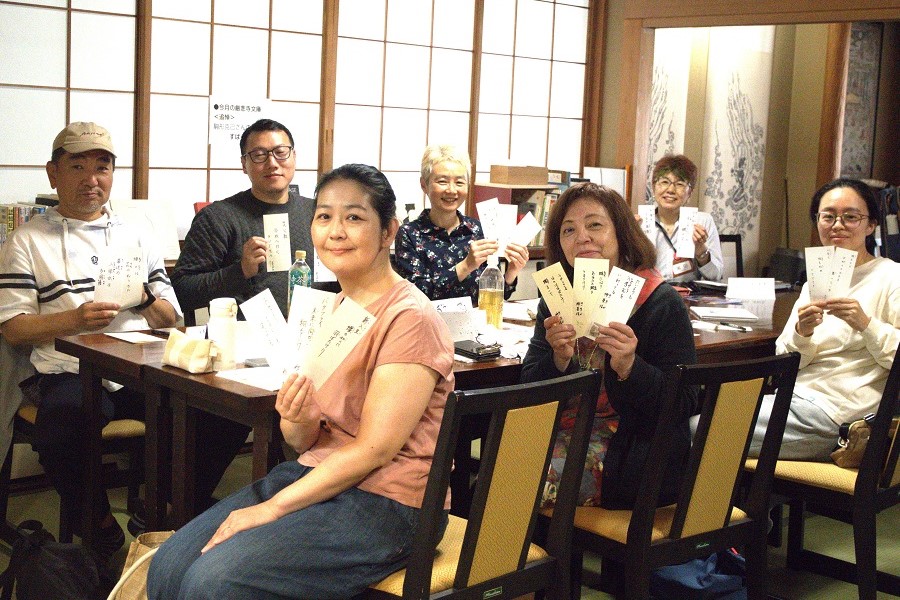
After about a year and a half since the group started its activities, various activities have deepened interaction between Japanese and foreigners in the community. An increasing number of foreign residents are actively participating in local activities, such as joining neighborhood associations, carrying portable shrines at local festivals, and participating in crime prevention patrols, as a result of the activities of the group. Neighborhood interaction that is typical of a downtown area has begun to emerge, with foreign residents teaching elderly residents how to use mobile phones and replacing light bulbs, and Japanese residents taking care of a Chinese family’s dog while they were on vacation.
"Through my activities to this point, I have felt that there was a lack of 'bridge-building' between Japanese and foreigners in the community, until the interactions between the two began. We would be happy to play such a role as a group. Also, neighborhood associations are gradually changing, such as sending out town news in plain Japanese on their official LINE account, making posters in plain Japanese at events such as mochi pounding, and making more moves to involve foreign residents. We believe that in order to achieve a multicultural coexistence, it is important that our activities have an impact not only on those who are interested, but also on those who have not had much interest up to now. We would like to explore ways to create a multicultural environment that is suited to Taito City," says Ms. Yamafuji.
The activities of "Taito Tabunka Kyosei Machizukuri no Kai" will continue in order to build equal relationships between foreigners and Japanese - as residents of the same community - and to create a community where all residents can live in comfort.
*This article is based on information available at the time of the interview. For the latest information, please contact the organization directly.
